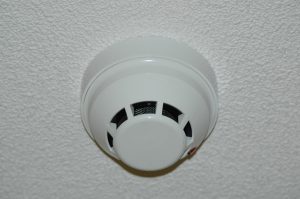 Our safety is of prime importance as regards to how we live. It is thus essential to ensure that you live in an environment that is safe at all times. One of the grave dangers is fires. If ever a fire breaks out in our home, the results could be devastating and even fatal. It is thus vital to ensure that we put in place adequate measures that will not only prevent house fires but those that will also detect it. A fire doesn’t need something big to be ignited, even a used cigarette left in the wrong place can result into a catastrophic blaze. A few of the causes of fires in our homes include gas leaks and electrical malfunctions. In case a fire breaks out it is essential to take immediate action and to do this you first need to detect the flame. It is where smoke alarms come in handy. A smoke alarm is an instrument or device that detects fire through the amount of smoke that is emitted by the blaze.
Our safety is of prime importance as regards to how we live. It is thus essential to ensure that you live in an environment that is safe at all times. One of the grave dangers is fires. If ever a fire breaks out in our home, the results could be devastating and even fatal. It is thus vital to ensure that we put in place adequate measures that will not only prevent house fires but those that will also detect it. A fire doesn’t need something big to be ignited, even a used cigarette left in the wrong place can result into a catastrophic blaze. A few of the causes of fires in our homes include gas leaks and electrical malfunctions. In case a fire breaks out it is essential to take immediate action and to do this you first need to detect the flame. It is where smoke alarms come in handy. A smoke alarm is an instrument or device that detects fire through the amount of smoke that is emitted by the blaze.
Today there are various types of smoke alarms, and some of them include:
Ionization Smoke Alarms – This type of alarm work by monitoring the quality of air. They are designed to detect tiny particles of combustion that cannot be seen or smelt. They are instrumental since they respond very quickly to hot, fast flaming fires. On the downside, these alarms are highly sensitive. To some extent, this is positive; however, it means that they are very susceptible to false alarms since dust, steam and small insects can also trigger them.
Optimal Smoke Alarms- This type of detectors detect the actual smoke. They use an emitter to direct a little infra-red beam onto a receiving photocell. Thus as the smoke cells enter the detection chamber, the infrared beam is interrupted which breaks the circuit, and the alarm is activated. These alarms are useful in detecting slow-burning, smoky fires. Unlike ionisedsmoke alarms, these are less prone to false alarms.
Whenever homeowners want to install smoke alarms in their home, the big question is which type of alert system to fit or whether they should install a heat alarm. It is a valid question. Smoke alarms come at different prices, and some will do better in specific places while others will not. For example, it would not be ideal to install a smoke alarm in the kitchen since a burnt toast or a grilled piece of steak will ignite it. It is, therefore, wise to install heat alarms in the kitchen and smoke alarms in other living areas.
